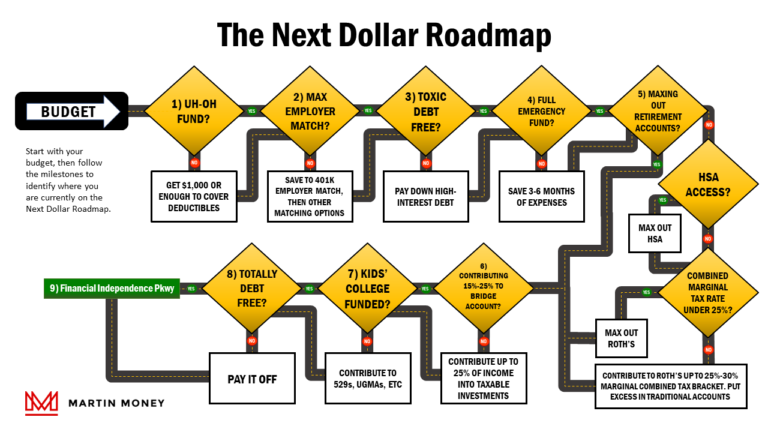How to Leave an Inheritance
It seems the older we get, the more complex our finances become. From this web of assets, there are several approaches one could take for making their estate plans. Knowing the impacts on your heirs is important for optimizing this process.
Estate planning isn’t exactly my idea of fun.
And who came up with the word “estate” for this context?
Very diplomatic, but we still know it’s a discussion about death.
Like it or not, death is an inevitability and one that we should plan for financially. As the old saying goes, “you can’t take it with you.”
It’s only prudent to arrange one’s affairs in such a way as to maximize the benefits and use of the possessions you leave behind for whatever desire you have for them.
By the way, if you choose not to do this, then you effectively have selected the state to be your executor.
Nothing says “miss you bunches” to your heirs like having an indifferent judge distribute the inheritance in whatever order the state legislature determined was fair years in advance.
In any event, given the circumstances, we’ll try to make this as lighthearted as we can.
Before we begin, I want to explain what this post is and is not because we will be making some significant assumptions as we talk about estate planning.
1) I’m assuming you’re leaving your estate to your kids. Most people do and if we try to dance around accounting for every scenario this post will get kind of long.
I will also assume that your children are healthy, grown, and self-supporting, so we won’t be covering trusts for special needs.
2) I’m assuming you have a modest net worth that does not exceed the federal estate tax exemption.
There are some very heady strategies for sheltering at least some portion of a large estate from estate taxes, but frankly, they deserve professional input. Maybe I can write a separate post about that one day, but I won’t be covering it here.
3) I’ve titled this “How to Leave an Inheritance”, not “How to Receive an Inheritance” because I am assuming almost everyone wants to receive an inheritance in as liquid a condition as possible and subject to as little taxation as possible.
I realize your family may have land or a cool car or something that will get passed down, but again, I’m not trying to account for every circumstance.
4) I will refer to one of my favorite books in this post and provide a link to it in the content. We do not receive a commission if you go and buy it, but you should go and buy it anyway.
Without further delay, here are some things to bear in mind as you make your own plans.
1: Take Care of Yourself First
Some people are givers. It’s how some of us are hardwired to express love to others.
And as many of these givers accumulate wealth, they may have an honorable desire to begin sharing more of it with their loved ones.
There’s not really anything wrong with the motive here, but if you do decide to give financially to others be sure to hang on to enough for yourself.
Typically, we’ll reach our peak earning years in our late 40s and early 50s, which is also normally when parents send their kids off to college.
If you elect to assist your kids with post-secondary education costs, you know this can be an expensive period in your life.
Once they’re out of school though, they’re mostly out of your budget too.
Suddenly, you find yourself with peak earnings, low debts (if any), and a sudden dramatic decrease in expenses. What a time to be alive!
It can be tempting to assume that you can just coast from here on out and you may be able to, or maybe you won’t.
A study by the Health Research and Education Trust showed that nearly half of one’s lifetime medical expenses occur after age 65.
Likewise, long-term care costs are almost completely experienced in the last years of a person’s life.
You need to keep this in mind as you exercise generosity. Don’t forget to put your oxygen mask on before helping others.
It’s been said that one of the best gifts you can give your kids is to not move into their basement.
If at any point in your life, you have agreed with this statement, keep it in mind before you hand away money you might need later on in life.
2: Raise Good Kids
This isn’t a parenting blog but this point is relevant for estate planning.
You will find estate planning to be a much easier process if you have mature, wise, and unselfish children.
One of my all-time favorite books is Beyond the Grave: The Right Way and the Wrong Way of Leaving Money to Your Children (and Others) by Jeffrey Condon.
It may be surprising to hear that an estate planning book would be such a hit, but I’ve read it several times now.
What makes this book so exceptionally entertaining is that it is written in story format by an estate attorney who shares years of stories about clients he has helped over the years.
There are some real doozies about estate plans gone awry, inheritance squandered by heirs, and some very sad stories about people who were effectively cut out of their inheritance altogether because the grantor of the estate was too trusting of others to carry out his or her wishes.
Most importantly, this book really does a great job of opening your eyes to the potential pitfalls and risks that exist with estate planning.
In nearly every “bad” story though, there was an heir whose character and morals were clearly lacking.
It seemed like every time I’d finish a chapter I’d walk away with a greater challenge to parent my children thoughtfully than to organize the affairs of my estate any differently.
Imagine for a minute a child who knows you have considerable wealth and doesn’t think they need to achieve anything of significance for themselves since you’ll take care of them even after you’re gone.
Or what about children whose friendship is torn apart after your death as they fight over your money, or even who gets the silver or dad’s old hunting gun?
It happens.
Or what if your child, God forbid, struggles with addiction, and can’t be trusted with an inheritance windfall?
There are endless scenarios that could strike fear in the heart of any parent and the best antidote is for your children to be mature enough to handle a significant inheritance.
Ninety-nine percent of estate problems are probably created by loved ones with impure motives. That is, those who care more about their personal gain than preserving relationships with loved ones.
It’s sad.
Worse yet, this is a financial blog and I don’t have much parenting advice for you.
My suggestion is to just keep this on your radar, especially if you have young children, and try to bring up kids that aren’t obsessed with materialism.
3: Wills vs Trusts
We touch on wills and trusts on Milestone 9 of the Next Dollar Roadmap.
Legally speaking, a will is simply a list of instructions for your descendants (and everyone else) to have when you die.
With a will, your heirs/executor will have to enter probate to take possession of your assets that aren’t transferred at death due to a beneficiary statement, like in an IRA or 401(k).
Probate is actually a lawsuit filed against the estate for the assets to be distributed according to the will, if one exists, or according to the laws of the state (probably not ideal).
Because you must probate a will, the process is a matter of public record. Anyone can go to the courthouse, or maybe visit online, and see the details of the will.
A trust, on the other hand, is a legal entity created and funded by a grantor or grantors. Trusts even have their own tax identification numbers and they do not die.
Another way to explain this is that a trust is basically what people wish a will was: all your assets placed in a safe spot and privately distributed according to your wishes without the hassle of probate.
Trusts are more expensive to establish than wills, but allow for much greater flexibility for your heirs and the terms of a trust are much easier to enforce than a will.
Will | Trust | |
Cost to Establish | $300-$1000 | $3000-$5000 |
Cost to Probate | $2500 or more | $0 |
Elects Someone to Handle Affairs After Death | Yes | Yes |
Nominates Guardian of Minor Children | Yes | Yes |
Specify Healthcare Wishes | Yes | Yes |
Specify Gifts | Yes | Yes |
Tax Planning | Some | Complete |
Avoids Probate? | No | Yes |
Private? | No | Yes |
Easier for… | You | Your heirs |
One other item to remember when choosing between a will or a trust is the cost of probate. Yes, a will is cheaper to create, but the terms of a trust are much cheaper to execute.
Many times, when heirs find the will, they call the attorney who drafted it to help get the estate through probate.
Normally, the attorney will happily help for a flat fee (around $2,500) or a percentage of the estate.
There’s a reason lawyers jokingly refer to probate as the attorney’s retirement fund.
4: Write Down Your Intentions
If you have specific wishes for how you want your assets distributed, be clear by writing them down.
Again, for those of you in the back, WRITE IT DOWN!!
Telling Susie Q she gets Gran-gran’s wedding ring is only clear to Susie Q. How on earth is the rest of the family to know she was supposed to get it if you don’t have a written directive?
Despite your most optimistic point of view of your loved ones’ cordiality, inheritance seems to have a strange effect on people.
They don’t always completely trust one another or play nice. In fact, many times they don’t. (Go get the book and see for yourself.)
So, do everyone a favor, including Susie Q. Be very clear in your written instructions about how you want things distributed.
It isn’t reasonable to document every single item you own, but you should at least do this for the assets you think multiple descendants could have an interest in.
You might even discuss with them how they want to go about this process after you pass away, but be careful not to disclose who might get what. You only want that recorded in one place if possible.
5: Prioritize Bequeathed Assets
Let’s get back to some of the financial stuff, shall we?
When we started this post, we told you we would assume your heirs want to receive assets in as liquid a state as possible and with as little tax exposure as possible.
Also, when we talk about investment assets (like IRAs, HSAs, and treasuries) in this section, you should note that these pass upon your death to your beneficiaries as you have indicated with your custodian.
This occurs outside of probate and even overrides your will.
I see this as a feature of inheriting invested assets, so it will improve their ranking below in our list below.
Also, as you review this list, think of it as an opportunity to prioritize how you use your assets before you die.
This list is written assuming you want to make inheritance transfer easier on your heirs than yourself. If that’s not the case for you, you’ll need to adjust accordingly.
With that in mind, here are popular ways assets are transferred to heirs in the order of ease and cost to the beneficiary:
- Roth IRAs and Roth 401(k)s
- Cash
- Life Insurance
- Equities: Treasuries, Stocks, Bonds, Mutual Funds, etc.
- Personal Real Estate
- Rental Property
- A Business
- Traditional IRAs & 401(k)s
- HSAs
- Stuff
We have a more thorough explanation of all of these in our post about the 10 best assets to leave to your heirs.
6: Don’t Add Your Kids to the Account or the Deed
In many cases, people will attempt to avoid probate for certain assets by adding their heirs as co-owners to their deeds or other accounts.
We want to explain why this may be a bad decision.
In the section above, tax basis has a huge potential impact on the value of each inherited asset.
In some cases, your heirs will avoid costly taxes thanks to a free step up in the cost basis of the asset.
For investment assets (anything that appreciates in capital value or produces interest or dividend income) this free step up in basis is exceptionally valuable.
However, if you decide to put your heirs on the deed to real property or add them as a co-owner of any other assets, you effectively eliminate the benefit of a free step up in basis while also creating a potential financial risk to each other if one of you is sued or enters bankruptcy.
Instead, consider other ways to provide signature authority or even designate your heirs as beneficiaries outside of probate.
7: Talk to Them or Don’t
Another good practice is to create a cheat sheet or “If I die” packet for your family to use as they begin the challenging process of settling your estate.
You should also share with the chosen caretakers of your estate where your important documents are and update these documents annually, if not more often.
Just imagine trying to follow the breadcrumbs yourself if you were selected for this responsibility. Do your executor a favor and make their job as easy as possible.
I don’t see any need to share more information than this about your estate (beyond your spouse anyway).
The reason I wouldn’t talk about it much is it’s all still yours.
You can’t guarantee that you’ll leave any of it to them, so it isn’t necessarily helpful to share what you hope happens because they may plan on it as if it was a certainty.
Not only that, you don’t know when you will pass away. Who knows? You might make it past the century mark.
You might outlive your original heirs and have to go with a backup group later.
You could get sued. The economy could collapse. You could have a costly health problem. Etc. etc. etc.
If, however, you really want to share your intentions (and you should present them as intentions) then you should share them with all of your heirs and share all of the same information to them.
I can see some benefit to having these conversations just so everyone has an idea what to expect when you pass away.
If you will be leaving an unequal inheritance to your kids, you should have a very good reason and should certainly have those conversations with them to explain why. (Again, you should read the book.)
I still wouldn’t tell them how much the estate is worth, but that’s just me. I’d rather not give my heirs a reason to want me to hurry up and die.
8: Give It Away While You’re Alive
The first two topics we covered in this post were 1) take care of yourself first, and 2) raise good kids.
Assuming those are in order, why not consider giving your estate away while you’re alive to see the benefit of it?
Each year, everyone is allowed to give up to the annual gift tax exclusion amount to any other person without reporting it to the IRS. (You can give more tax-free. Click the link to read about it in detail.)
In 2023, this amount is $17,000. As a couple, you can double this amount.
Perhaps you’re too humble to get the credit, so you’d rather leave it as an inheritance.
I, for one, hope I’m able to do this one day for the people I love so I get to see the impact.
I want the hugs too.
There are a lot of thoughtful ways to do this without spoiling your heirs:
- Contribute to a 529 for children in the family;
- You can pay down part of your kid’s mortgage or other debt;
- Pay for family vacations;
- Direct them to put the money into retirement savings.
Ultimately, it’s up to you, but it sounds more fun to me to give away what I can while I’m still alive.
Conclusion
Man, we covered a lot of ground here. Thank you for reading.
Hopefully, this illustrates just how important estate planning is.
Even if you’re relatively young, you need some basic plans in place and you might as well be thinking about how you want to handle more significant wealth if you get there one day.
Do me a favor and please don’t send this to your parents. I don’t want this post to be weaponized and have them hate me in the process.
Instead, bear it in mind as you do your own estate planning and maybe be encouraged to speak for yourself if you want to discuss this with your folks.







